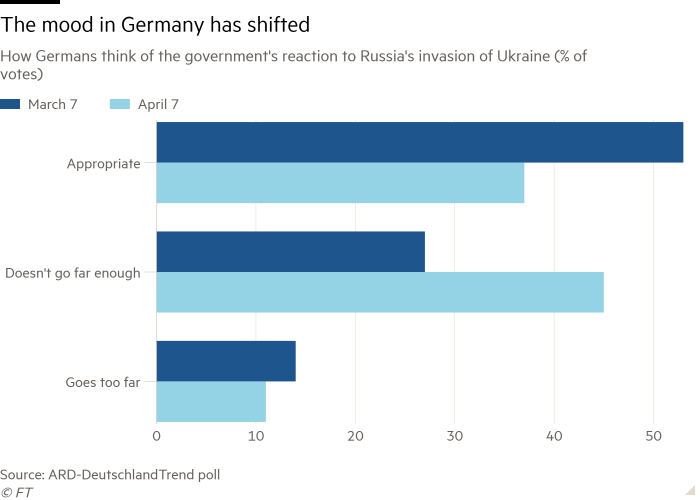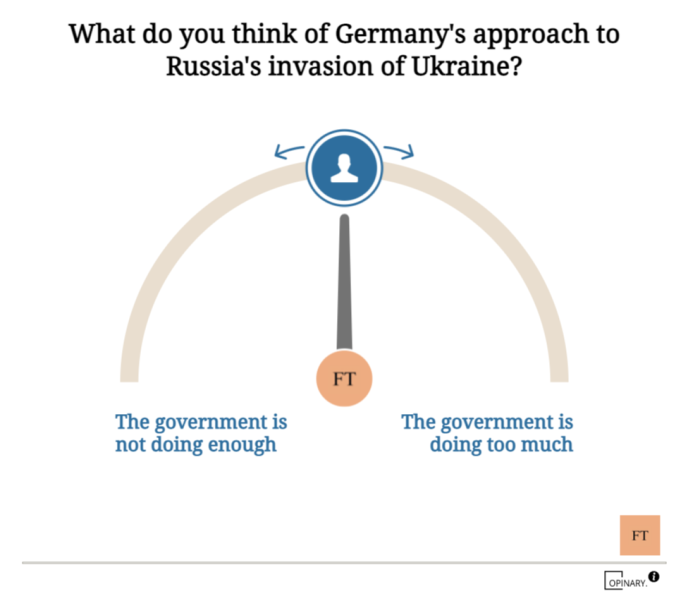Germany scrambles to change its Russia policy
This article is an on-site version of our Europe Express newsletter. Sign up here to get the newsletter sent straight to your inbox every weekday and Saturday morning
Good morning and welcome to the Financial Times’ Europe Express Weekend newsletter. I’m Tony Barber, the FT’s European Comment Editor, and every Saturday, I’m unpacking one of the big themes from the week.
Let’s start with a question. What’s the connection between Germany’s ruling Social Democrats and liver sausage?
German-speakers will know that I have in mind Andriy Melnyk, Ukraine’s spiky ambassador to Berlin.
It all began when Olaf Scholz, Germany’s SPD chancellor, reproved Ukraine’s government for indicating last month that Frank-Walter Steinmeier, the German head of state (and another SPD luminary), wasn’t welcome in Kyiv.
The diplomatic row was patched up this week after a phone call between Steinmeier and Volodymyr Zelensky, Ukraine’s president. But before that happened, Melnyk hit back at Scholz, saying: “It doesn’t sound very statesmanlike to behave like a beleidigte Leberwurst.”
Literally, this means an “insulted liver sausage”. It describes a thin-skinned person who easily takes offence.
Why was Melnyk having a pop at Scholz? For one thing, he is aghast that Germany has been slower than its Nato and EU allies to provide large-scale military support for Ukraine after Russia’s unprovoked invasion on February 24.
As Guy Chazan, the FT’s Berlin bureau chief, reports, Scholz is in fact getting Germany’s act together after a hesitant start. But Guy’s analysis contains this revealing observation from Christoph Heusgen, who served as foreign policy adviser to former chancellor Angela Merkel:
We do the right thing but we always do it a bit late.
Yes, indeed. Some would say that sums up German policy during the eurozone’s sovereign debt and banking emergencies.
However, be in no doubt: Germany can act quickly and independently in a crisis when it chooses. One year after German unification in 1990, communist Yugoslavia was disintegrating in war. To the shock of most of its EU partners, the German government unilaterally recognised the independence of Croatia and Slovenia. The war spread to Bosnia and Herzegovina a few months later.
Melnyk’s second point is that Germany is burdened with a decades-long policy of being nice to Russia. This has proved to be especially wrong-headed in the era of Vladimir Putin. It has often appeared to ride roughshod over smaller countries in eastern Europe, including Ukraine.
Steinmeier symbolises this policy. In a powerfully argued article for the German Council on Foreign Relations, Tyson Barker calls Steinmeier “part of the so-called Hanover Mafia of protégés of the former chancellor Gerhard Schröder”.
Steinmeier was chief of staff to Schröder, who to the enormous embarrassment of the German establishment makes no secret of his Russophile leanings. Then, before he was elevated to the presidency, Steinmeier was Merkel’s foreign minister. In 2008 he travelled to the Urals city of Yekaterinburg, where he gave a speech entitled “Time for a German-Russian Modernisation Partnership”.
Now Steinmeier admits that Germany misread Putin. But many Ukrainians suspect that the instinct to try to “understand” Russia is still widespread inside the German government. Melnyk epitomises these suspicions, though other Ukrainians praise Germany for its help.
Die Zeit, a leading German newspaper, published this penetrating profile of Jens Plötner, foreign policy adviser to Scholz. “He perceives the Ukrainians as difficult friends. The fact that the country is locked in a struggle for existence does not seem to register with him,” Die Zeit wrote.
But German public opinion appears to be hardening. An ARD-Deutschlandtrend poll shows that more and more Germans think the government isn’t doing enough to back Ukraine.

It is a commonplace that Berlin’s desire for constructive relations with Moscow stemmed from the notion of Wandel durch Handel — beneficial change in Russia thanks to trade with Germany.
I hope I’m not turning this week’s newsletter into a German language lesson, but I’d like to introduce readers to an equally important official concept in German foreign policy over the past 15 years — Annäherung durch Verflechtung. This can be translated as rapprochement through interconnectedness.
Russia’s attack on Ukraine has discredited these ideas. But let’s be clear about something. Roughly half a century ago, Willy Brandt’s SPD-led government pursued a policy of reconciliation with West Germany’s eastern neighbours known as Ostpolitik.
It was brave and absolutely the right thing to do. But it has nothing in common with the shambles of Germany’s Russia policy since the start of this century.
What do you think? Is Germany doing enough to support Ukraine? Should it do more? Should it do less? Let us know by voting in our poll here.

And finally
Is the Turkish opposition squandering its chance to defeat Recep Tayyip Erdoğan?, asks Laura Patel. The imprisonment of businessman and philanthropist Osman Kavala underscores the drift to autocracy under the Turkish strongman, writes the FT editorial board.
Tony’s picks of the week
Recommended newsletters for you
Are you enjoying Europe Express? Sign up here to have it delivered straight to your inbox every workday at 7am CET and on Saturdays at noon CET. Do tell us what you think, we love to hear from you: [email protected]. Keep up with the latest European stories @FT Europe
For all the latest Business News Click Here
For the latest news and updates, follow us on Google News.
